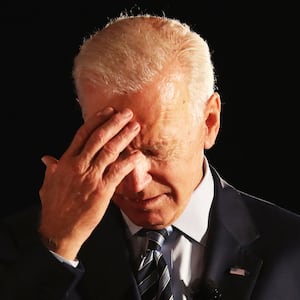As U.S. diplomats expressed concern to a top Ukrainian official that the country’s president was showing openness to investigating a former political rival, that official had a quick rejoinder at hand. The Trump administration, he explained, was doing the exact same thing.
That exchange was revealed by George Kent, the State Department’s deputy assistant secretary for European and Eurasian affairs, in his impeachment inquiry testimony. And it underscores the degree to which he and others believed that President Donald Trump’s eagerness to have the Ukrainians investigate Joe Biden and his son Hunter had complicated U.S. policy and moral standing.
According to Kent, the conversation at issue took place between then-U.S. envoy Amb. Kurt Volker and Amb. Bill Taylor on September 14 with Andriy Yermak, a senior adviser to Ukrainian President Volodymyr Zelensky. Kent wasn’t present for what he described as an “awkward” conversation. But he said Taylor described it to him the next morning.
“[T]he main part of the conversation was about negotiations with the Russians, and I won’t mention that and that’s not germane,” Kent said, according to a transcript of his testimony that was released on Thursday. “But the more awkward part of the conversation came when Special Representative Volker made the point that the Ukrainians, who had opened their authorities under Zelensky, had opened investigations of former President Poroshenko, he didn’t think that was appropriate. And then Andry Yermak said: What? You mean the type of investigations you’re pushing for us to do on Biden and Clinton? And at that point Kurt Volker did not respond.”
Later, the conversation turned to the topic of a White House meeting between Trump and Zelensky. Volker said that it was “important that President Zelensky give the messages we discussed before,” according to Kent. Then Taylor interjected and said to Yermak, “Don’t do that.”
“My understanding is that he was concerned,” Kent said of Taylor. “And when Kurt made a suggestion that Charge Taylor felt was inappropriate, he weighed in with his own personal opinion, which that was not appropriate.”
The exchange highlights the discomfort that Zelensky aides felt regarding pressure from Americans that they announce an investigation into one of President Donald Trump’s main political rivals. Since Zelensky’s election on April 21, he and his aides had worked hard to arrange a meeting at the White House with Trump. Trump sent him a letter on May 29—first published by The Daily Beast—inviting him to visit and promising “unwavering” support from the U.S. Trump had a hard time with the letter, per Kent; the diplomat said that Trump “actually ripped up” the first version of the letter that was presented to him. Kent said he heard that European Union Amb. Gordon Sondland helped write a second draft, which Trump ultimately signed.
But American officials later communicated to Zelensky aides that if they actually wanted the visit to happen, Zelensky needed to announce that Ukraine was investigating alleged interference in the 2016 U.S. election and a probe of an oil company where Biden’s son was a board member.
The Ukrainians never announced the investigations. And they still haven’t gotten a White House meeting.
Elsewhere in his testimony, Kent recounted a separate conversation between Volker and Yermak—as recounted to him by Taylor—in which the Zelensky aide was again pressed on the “initiation of investigations.”
“Yermak was very uncomfortable when this was raised with him, and suggested that if that were the case, if that were really the position of the United States, it should be done officially and put in writing,” Kent recalled, “And I told Bill Taylor, that's wrong, and we shouldn't be doing that as a matter of U.S. policy.”
That said, Kent indicated that Trump and Zelensky had started their relationship–at least for a few moments–on the right foot. Kent said that Lt. Col. Alex Vindman, a senior official handling Ukraine policy on the National Security Council, gave him a read-out of the congratulatory call Trump made to Zelensky on the night of his election.
“President Zelensky, as I recall what Alex told me, said that he had studied President Trump’s win in 2016 running as an outsider and had adopted some of the same tactics,” Kent said.







